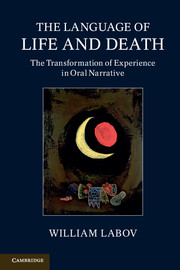Book contents
- Frontmatter
- Contents
- Preface
- Acknowledgments
- 1 Introduction to the language of life and death
- 2 Narrative analysis
- 3 The escalation of violence
- 4 Confrontations with death
- 5 Premonitions and communication with the dead
- 6 Margie Knott: “Her confrontation with the neighbors”
- 7 Gloria Stein: “They stoned the house”
- 8 Rose Norman: “The death of her younger sister”
- 9 Mary Costa: “The death of her youngest daughter”
- 10 Cache County
- 11 The vernacular origin of epic style
- 12 Historians' use of narrative
- 13 Thomas Babington Macaulay: “The death of Monmouth”
- 14 S. T. Bindoff: “The death of Elizabeth”
- 15 2 Samuel: “The death of Absalom”
- 16 The narrative view of death and life
- References
- Index
14 - S. T. Bindoff: “The death of Elizabeth”
Published online by Cambridge University Press: 05 June 2013
- Frontmatter
- Contents
- Preface
- Acknowledgments
- 1 Introduction to the language of life and death
- 2 Narrative analysis
- 3 The escalation of violence
- 4 Confrontations with death
- 5 Premonitions and communication with the dead
- 6 Margie Knott: “Her confrontation with the neighbors”
- 7 Gloria Stein: “They stoned the house”
- 8 Rose Norman: “The death of her younger sister”
- 9 Mary Costa: “The death of her youngest daughter”
- 10 Cache County
- 11 The vernacular origin of epic style
- 12 Historians' use of narrative
- 13 Thomas Babington Macaulay: “The death of Monmouth”
- 14 S. T. Bindoff: “The death of Elizabeth”
- 15 2 Samuel: “The death of Absalom”
- 16 The narrative view of death and life
- References
- Index
Summary
Among the historians whose writing I have admired, none bulk larger than Stanley Thomas Bindoff. His published work deals with the political history of the Elizabethan era; the book I know most intimately is the 1950 Pelican edition of his Tudor England. This chapter will extract from that larger history his narrative account of the death of Queen Elizabeth I. It will allow me to define more precisely the boundary between narrative history and historical analysis, and to assess the strengths and weaknesses of each approach to interpreting and understanding the past.
Before entering into this particular confrontation with death, it will be helpful to examine Bindoff's narrative of a death that shortly preceded that of the queen: the rebellion and execution of her favorite, Essex. Bindoff introduces Essex with this non-narrative description of the final stages of Elizabeth's reign, the setting in which Essex rose to fame and power.
As one after another, they were laid in their sumptuous graves the Old Guard of Elizabethan England left behind them a sovereign who, beneath her mask of perennial youthfulness and vitality, grew ever more conscious of her years and her loneliness, and a government which lost, with them, not a little of the stability which had been the fruit of their long service and ripe experience. In particular, it was the partial vacuum created by their passing which helped to raise that political whirlwind of the nineties, the career of Robert Devereux, Earl of Essex.
The hand which fate had dealt this last of the Tudors' over-mighty subjects was strong in two suits. There was that unique complex of charms – the beautiful face and body, the brilliant personality and style – which first captured the royal favour and then time and again recovered it after follies which would have doomed a less ornamental offender. Then there was the “noble forwardness in arms” which made its possessor the darling of the “men of action,” that significant element in the nation which the war had precipitated to the surface of affairs.
- Type
- Chapter
- Information
- The Language of Life and DeathThe Transformation of Experience in Oral Narrative, pp. 203 - 209Publisher: Cambridge University PressPrint publication year: 2013



